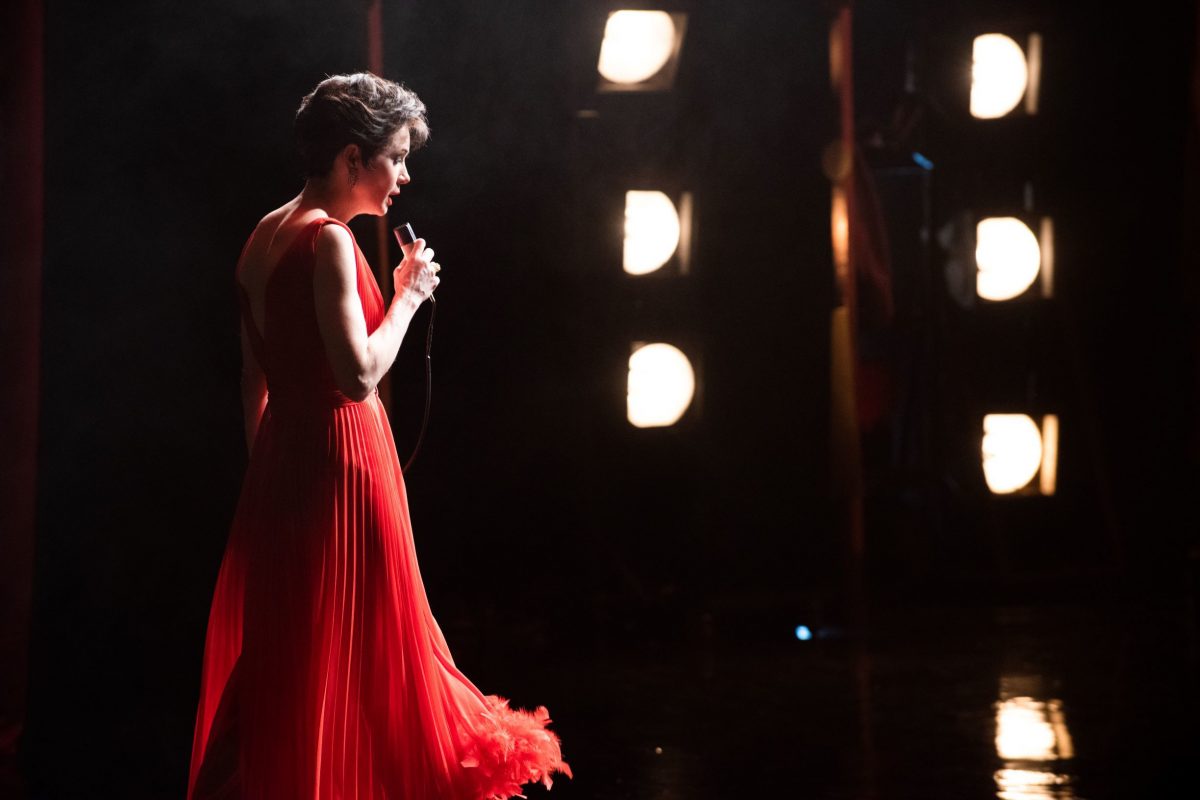
I have a theory about things like low-fat ice cream or tofurky. They only taste good if you don’t compare them directly to the real deal. That’s the case with Renee Zellweger’s vocals in the new Judy Garland biopic, Judy. The filmmakers—director Rupert Goold and screenwriter Tom Edge (the film is based off the Peter Quilter stageplay, End of the Rainbow)—have argued that since this was late period Garland, after one drug overdose and a tracheotomy, Zellweger could at least approximate the icon’s fading voice. And, after first watching the film, I agreed. Then I dug up a YouTube video of Garland singing around that same time. Big mistake. Garland is a once-in-a-generation vocal talent. Turns out, even bad Garland is great Garland.
Still, there’s lots to recommend about Zellweger’s performance. She captures Garland’s jaded, world-weary manner; the sadness that permeated even her happiest moments; and the injured little girl that still lived inside her. With her tom-boyish bob, whippet-thin frame, and fabulous ’60s wardrobe—cowl neck shift dresses and gold lamé pantsuits—she looks the part. And in performance, she channels Garland—not just the blowsy way she moved about the stage, but the raw emotion she poured into her songs. Still, I really recommend avoiding all Garland recordings for at least two (2) full weeks after seeing the performance.
As for the film, it’s a mixed bag. I appreciate the fact that it doesn’t go for the Wikipedia version of Garland’s life. It mostly focuses on the final stage of her career—a desperately-needed 1968 engagement at London’s Talk of the Town theater (Garland was broke and all the American gigs had dried up)—with flashbacks to her horrible, oppressive experience as a child star (Louis B. Mayer comes across as an abusive, Harvey Weinstein-adjacent creep). Garland has only taken the gig as a last gasp attempt to retain custody of her two youngest children. In London, she’s surrounded by people, most notably Mickey Deans (Finn Wittrock), the slightly sleazy young American businessman whom she regrettably agrees to marry; Burt (Royce Peterson), the gentle bandleader who adores her but is wary of her evident decline; and Rosalyn Wilder (Jessie Buckley), the officious young woman assigned to be her minder during her stay in London. But these relationships aren’t particularly fleshed out. The relationship with Rosalyn, in particular, could’ve been the heart of the film—especially since Judy is longing to be back in the U.S. with her kids—but it’s curiously uninvolving. Mostly Rosalyn cleans up Judy’s messes and stares at her with a look of stoic disappointment.
The best scenes of the film—fleeting as they may be—involve a middle-aged gay couple, Stan (Andy Nyman) and Dan (Daniel Cerqueira,) who are Judy superfans and attend as many of her shows as possible. One late night, as they are the only two waiting for her by the stage door, she signs their programs and, much to their astonishment, asks if they want to grab dinner. Since it’s past midnight, nothing is open and they end up back in the couple’s flat, where they eat runny eggs, sing songs, and reminisce. I found the profound joy and disbelief on Stan’s face—and the couple’s enduring loyalty to the singer despite her troubles—to be quite moving.
But much of Judy feels a little inert. Maybe it’s almost too laser-focused on this one particular, sad chapter of Garland’s career. The film gets a little repetitive (performance, meltdown, repeat). It’s more than worth seeing for Zellweger’s performance, though. She may not sing like Judy but she can definitely act like her.
